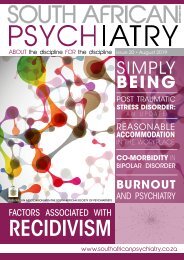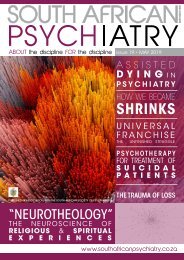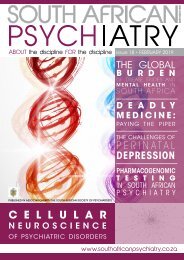South African Psychiatry - November 2020
South African Psychiatry - November 2020
South African Psychiatry - November 2020
Create successful ePaper yourself
Turn your PDF publications into a flip-book with our unique Google optimized e-Paper software.
ADHD CONGRESS
1 ST SOUTHERN AFRICAN MULTIDISCIPLINARY ADHD CONGRESS
increased sleepiness, depression and weight
related issues.
• The impact of ADHD on RLS, which includes
increased leg movements, disruptive sleep,
hyperkinesia, periodic limb movement, as well
as daytime impairments.
• That adolescents with both ADHD and insomnia
produce more errors in cognitive assessments.
Dr Moola emphasised that when diagnosing
and treating of ADHD and SBDs, it important to
do a complete and comprehensive assessment,
in order to determine the impact on daytime,
emotional and physical wellbeing and to
subsequently follow a multidisciplinary approach
to the management of both disorders. He outlined
various treatment options for various age groups,
which include medication, psychoeducation and
sleep hygiene.
Important to note is that Dr Moola highlighted a
dearth in the literature regarding sleep disorders
and ADHD, as well as a lack of empirical evidence
regarding daytime impairments.
HE WAS CONCERNED THAT THE DATA
IN RECENT STUDIES CAN LEAVE AN
INDIVIDUAL A BIT DISARRAYED AND
POINTED OUT THAT THERE IS A NEED FOR
MORE RIGID STUDIES, ASSESSMENT TOOLS
AND STRUCTURES IN STUDY DESIGN THAT
CAN GIVE MORE CONSISTENT DATA.
ADHD AND ANXIETY
Dr Larry Klasse, a psychiatrist based in Canada,
comprehensively explored the relationship
between ADHD and anxiety and noted that there
are many comorbid conditions that often present
in individuals who have ADHD. He outlined the
prevalence of mood and anxiety disorders in adults
with ADHD. Anxiety was noted to have the highest
prevalence (47.1%) and dysthymia the lowest
(12.8%).
ADDITIONALLY, HE INDICATED THAT THERE
WAS A HIGH COMORBIDITY RATE OF
ADHD IN OTHER MOOD AND ANXIETY
DISORDERS.
It was emphasised that health professionals
should be aware that there are many overlapping
symptoms in ADHD and comorbid conditions.
For example, substance use disorder can
include restlessness/agitation, impulsivity, and
concentration difficulties and hypomania in
bipolar mood disorder can include excessive
talking, restlessness/agitation, racing thoughts,
impulsive behaviours, concentration and attention
difficulties, as well as mood swings.
Dr Klasse described the effect of how comorbid
anxiety disorders and ADHD can impact an
individual. He highlighted the following regarding
ADHD and comorbid anxiety:
• An individual will struggle with more severe
anxiety, earlier onset of anxiety and additional
psychiatric conditions.
• The presence of anxiety in adult ADHD, may
give rise to additional clinical effects resulting
in more impairment and poorer prognosis and
greater resistance to treatment.
• Children with both ADHD and anxiety, were
shown to be more likely to struggle with a
more severe course of anxiety and other
comorbidities (Mancini, et al. (1999), Schatz et
al. (2006), Alexander et al. (2013) Biederman
(2004), Alm et al. (2005)).
Furthermore, Dr Klasse highlighted research
indicating that that there are some individuals
that have been diagnosed with psychiatric
disorders that have undiagnosed ADHD. This is
often associated with poor treatment response,
non-compliance of treatment and lack of
improvement in symptoms. He emphasised that
it is imperative to treat the ADHD to prevent the
worsening of comorbidities. (Barkley PA, Brown TE,
2008).
A diagnostic priority in how to treat ADHD as well as
comorbidities was emphasised by Dr Klasse.
THIS INVOLVES TREATING THE MOST
SEVERE CONDITION FIRST AND
ONLY ONCE THOSE SYMPTOMS ARE
MANAGED, TO THEN ADD TREATMENT TO
ADDRESS OTHER AREAS OF CONCERN
(GOODMAN D, 2005).
Both pharmacological and psychological
treatment and benefits were outlined in his
presentation. Dr Klasse notes that the correct
treatment of individuals can help in avoiding
sequelae, such as developing secondary
disorders, preventing car accidents, and
developing substance use disorder (Biederman
et, al., 2019).
SOUTH AFRICAN PSYCHIATRY ISSUE 25 2020 * 49
















